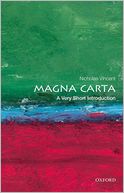Evil King John and the Birth of English Common Law
By Nicholas Vincent
Oxford University Press 11.95 144 pages
Despite its slide toward legal obsolescence, the Magna Carta remains one of the most significant documents in the history of the Western world. Issued in 1215, it was originally intended as a peace treaty between King John and his barons. The drama that played out between John and the English aristocracy is captured in rewarding detail by Nicholas Vincent, who accounts in his Very Short Introduction for the complexity of the Magna Carta as well as the reasons it continues to attract attention today.
“Thus [the] Magna Carta remained at the centre of the political stage: a venerable actor from the past whose longevity was prized above all other aspects of performance and whose retirement the public simply refused to allow.”
Having successfully located the Magna Carta within the context of medieval Europe, Vincent sets out to debunk the perception that the charter sought to codify English law. Vincent is equally convincing in his attempts to dissociate the Magna Carta from more abstract ideas like equality and freedom. The Magna Carta was an attempt, he writes, to “curb the arbitrary exercise of royal power.” It was not, however, designed to endow the English population with political liberties. This was to come later.
The Magna Carta, nevertheless, assumed a revolutionary complexion: as a negotiated peace, it limited the power of the king while ensuring his adversaries the right to make war should the charter be violated. When, nine weeks later, John reneged on his commitments, civil war ensued. But the conflict itself was emblematic of a subtle shift that had occurred: once a treaty between two factions, the Magna Carta emerged as a piece of legislation that, over time, was to engender a more rational form of governance.
Reviewed by Jesse Freedman
[amazon asin=0199582874&text=Buy On Amazon]
[amazon asin=0199582874&text=Buy On Amazon&template=carousel]

